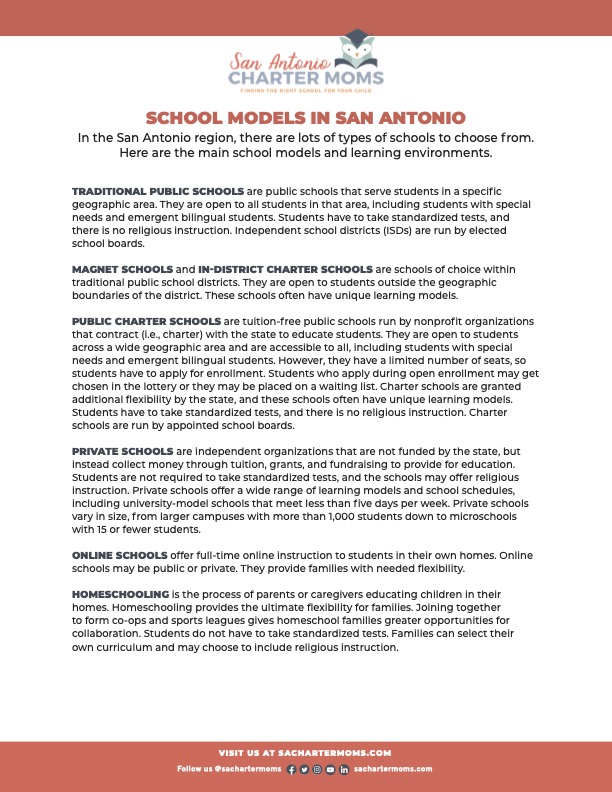
When you are searching for the right school for your child, what types of school models and learning environments will you find? In this guide, we will compare these school models: traditional public schools, magnet schools, in-district charter schools, public charter schools, private schools, online schools, and homeschooling. We will explain what features they have in common and what their differences are. Our goal is to help you know what to expect in the school search process and show you tools to guide you towards enrolling your children in high-quality schools that are the right fit for their needs.
School Models and Your School Search
When new families join the San Antonio Charter Moms discussion group on Facebook, they often have basic questions about the differences among school models. There are so many types of learning environments, and it can get confusing quickly. We understand the feeling of being overwhelmed: All of our team members have asked those fundamental questions at one time or another. Our goal is to make the process easier for the families who are walking this path after us.
Here are some of the factors that differentiate school models:
- How are the schools funded? (e.g., federal, state, local, or private funding)
- How are the schools governed? (i.e., is the school board appointed or elected?)
- Do students have to live in a neighborhood zone to attend the school?
- Are there a limited number of seats at the school?
- How big are the schools?
- Does the school have a specialized learning model?
- Do students take state-mandated standardized tests?
- Are the schools rated on a state accountability system?
- Do students come to a building, attend classes remotely, study at home, or a combination?
- Do students have to take placement tests to qualify to attend?
- Does the school accept students who have functional needs?
- Does the school accept students who are emergent bilingual?
- Does the school offer religious instruction?
Comparing School Models
Traditional Public Schools
Traditional public schools are public schools that serve students in a specific geographic area. They are open to all students in that area, including students with functional needs and emergent bilingual students. Students have to take standardized tests, and there is no religious instruction. Independent school districts (ISDs) are run by elected school boards.
Magnet Schools and In-District Charter Schools
Magnet schools and in-district charter schools are schools of choice within traditional public school districts. They are open to students outside the geographic boundaries of the district. These schools often have unique learning models.
Public Charter Schools
Public charter schools are tuition-free public schools run by nonprofit organizations that contract (i.e., charter) with the state to educate students. They are open to students across a wide geographic area and are accessible to all, including students with functional needs and emergent bilingual students. However, they have a limited number of seats, so students have to apply for enrollment. Students who apply during open enrollment may get chosen in the lottery or they may be placed on a waiting list. Charter schools are granted additional flexibility by the state, and these schools often have unique learning models. Students have to take standardized tests, and there is no religious instruction. Charter schools are run by appointed school boards.
Private Schools
Private schools are independent organizations that are not funded by the state, but instead collect money through tuition, grants, and fundraising to provide for education. Students are not required to take standardized tests, and the schools may offer religious instruction. Private schools offer a wide range of learning models and school schedules, including university-model schools that meet less than five days per week. Private schools vary in size, from larger campuses with more than 1,000 students down to microschools with 15 or fewer students.
Online Schools
Online schools offer full-time online instruction to students in their own homes. Online schools may be public or private. They provide families with needed flexibility.
Homeschooling
Homeschooling is the process of parents or caregivers educating children in their homes. Homeschooling provides the ultimate flexibility for families. Joining together to form co-ops and sports leagues gives homeschool families greater opportunities for collaboration. Students do not have to take standardized tests. Families can select their own curriculum and may choose to include religious instruction.
School Models That Serve Children
What our team has learned from talking with parents and caregivers is that their number one concern is the well being of their children: Are they safe, are they learning, and do they feel like they belong? The specific school model is usually a secondary concern. We all benefit from school choice when students are able to learn in the setting that suits them best.
There are times when it’s helpful to understand more about school models. For example, when preparing to apply to schools, it’s good to know that charter schools have limited seats, and that applying during open enrollment increases your chances of getting an offer, as we explained in our post about school search timelines. Also, when applying to charter schools, you are not limited to your zoned neighborhood school—in fact, you can apply to schools across the metropolitan area.
We hope this post is a helpful tool, along with our School Choice Guide, School Discovery Days events, and the online community in our San Antonio Charter Moms discussion group on Facebook, as you search for schools that are the right fit for your children.
School Models Handout
Download or print this information as a one-page handout. The text is in English on one side and in Spanish on the other.

Charter Moms Chats
Inga Cotton, Founder and Executive Director of San Antonio Charter Moms, explains about different school models in this video recorded on August 28, 2023.
Inga Cotton is the Founder and Executive Director of San Antonio Charter Moms. Inga is the mother of Annika, age 13, and Nicholas, age 16, and on the autism spectrum. Inga is the Founder and Executive Director of San Antonio Charter Moms, a nonprofit that helps families find schools that are the right fit for their children and become advocates for quality education. Inga has lived in San Antonio since high school and has a B.A. in History from Trinity University and a law degree from the University of Texas. In 2011, she learned about new charter schools coming to San Antonio. She wanted to help spread the word to families, so she created the San Antonio Charter Moms blog in 2012. Over time, San Antonio Charter Moms became an online community, including an active discussion group on Facebook, and became a non-profit organization in 2018. Inga and her family enjoy hiking at parks and trails, going to museums and concerts, and trying new recipes and restaurants.
Read More About School Search
- “School Search Timeline,” San Antonio Charter Moms, August 21, 2023
- “How to Find the Best Schools in San Antonio,” San Antonio Charter Moms, February 25, 2020
- “The School Choice Roadmap,” Andrew Campanella, 2020
- “Searching for Charter Schools in San Antonio: What You Can Do in January,” San Antonio Charter Moms, January 17, 2019
- “Finding the Right Schools in San Antonio for Your Children – MOMS Club of San Antonio NE Edition,” Inga Cotton, San Antonio Charter Moms, April 9, 2018
